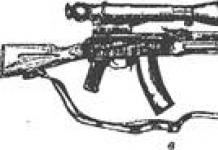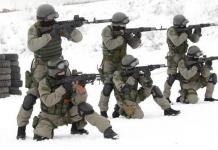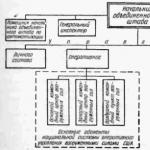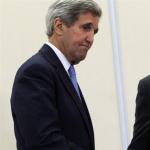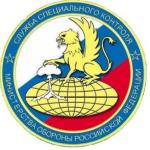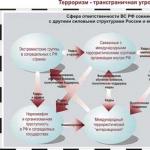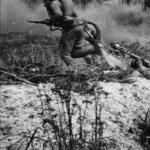Regarding the reasons for the start of the Syrian campaign and real tasks put before the Russian Aerospace Forces, there are many versions and hypotheses.
The official position of the authorities is the fight against terrorism at the distant approaches. One of the points of view spread on the Internet is the protection of the interests of Gazprom in the form of preventing the construction of the "Qatari pipeline". However, both of these versions raise one important question: why did the operation of the Russian Aerospace Forces in Syria begin only in the fall of 2015, and not a year or two earlier?
The war in Syria began back in 2011 and by 2013 had taken on such proportions that there was a serious threat to both the power of Bashar al-Assad and the integrity of the country. ISIS also arose quite a long time ago and the terrorist nature of the organization became obvious almost immediately.
It is no secret that any threat should be dealt with as early as possible, before it has taken on rampant proportions. Therefore, if the Kremlin was really most concerned about the threat of the spread of terrorism from the Middle East to the territory of Russia, then Bashar al-Assad should have joined the fight and provided assistance starting from 2012-2013.
The same applies to the version about the "Qatari pipe". The Real Threat the military defeat of Bashar al-Assad and the change of power in Syria arose back in 2013 - then it was necessary to join if the main task was to prevent the "Qatari stream".
In addition, the version about the "Qatari pipe" is purely economically absurd. In the short term, the Qatari pipeline does not pose any threat to Gazprom, because the construction of the pipeline is not a quick business. Until the end of the war (of which there is no end in sight), until the pipe is built, years will pass. This is not even a couple of years, but five or six years, no less. And then all ten.
As for the long-term perspective, the preservation of Bashar al-Assad's power does not give any guarantees that the Qatari pipe will not arise in the future. Firstly, Bashar al-Assad is not eternal, anyway, sooner or later he will be removed. Secondly, Syria will need money for reconstruction, so the Syrians themselves will be interested in building a Qatari pipeline - with or without Assad.
The operation of the Russian Aerospace Forces does not solve the problem of the possible emergence of a "Qatari pipe" in the long term. And in the short term, this problem simply does not exist. Therefore, the version about the "Qatari pipe" is absurd and is caused by the technical and economic illiteracy of its supporters, who suffer from gas-promo-centrism in the advanced stage.
The official version about the fight against terrorism on the distant approaches, as shown above, also raises some questions in connection with the late start of the operation.
Of course, the threat of destabilization of the Caucasus in the event of the victory of ISIS in Syria existed, but this threat arose long before 2015.
Why did the operation of the Russian Aerospace Forces begin at the end of 2015, and not earlier?
Maybe you used to think that Bashar al-Assad could handle it on his own?
Hardly. For some reason, one cannot believe in such naivety of Russian strategists. Back in 2013, the situation of Bashar al-Assad became extremely complicated and the Syrian authorities lost control over a significant territory, including part of Damascus. To think that Bashar al-Assad would get out of this situation on his own was simply stupid. Moreover, the Kremlin and the General Staff understood perfectly well who was behind the Syrian opposition and ISIS.
Back in 2013, it became clear that things were moving towards the destruction of the regime of Bashar al-Assad, and without external assistance this would become completely inevitable.
Then why did the operation of the Russian Aerospace Forces begin only at the end of 2015?
Maybe it took time to prepare?
Preparing a major military operation is a serious matter. But military science consists precisely in carrying out the preparation of military operations not only seriously, but also promptly enough. If you plan operations for two years, then you will never be able to carry them out - in two years the situation will change so much that you will have to prepare anew.
The preparation of the operation of the Russian Aerospace Forces could take several months, maybe six months, but not two.
Maybe it's about Bashar al-Assad, who did not want to ask Russia for military assistance earlier? Also unlikely. As far back as 2013, Bashar al-Assad's situation became so complicated that if Russia had offered him the option with the participation of the Russian Aerospace Forces, he would have agreed already then.
It turns out a difficult to explain delay with the start of the operation of the Russian Aerospace Forces - a delay of about a year and a half.
This delay has no explanation within the framework of the official version of the fight against terrorism on the distant approaches. And within the framework of the version about the "Qatari pipe", too, which is very typical.
But if we put the official version (and at the same time the version about the "fight against the Qatari pipe") aside and start from the time the operation began, trying to understand its causes based on the chronology of events, everything becomes much more clear both in time and in goals.
Let's remember what important events preceded the operation of the Russian Aerospace Forces in Syria:
March 2014 - the return of the Crimea.
May 2014 - Burkhalter's visit, the beginning of the war in Donbass.
September 2014 - the signing of the first Minsk agreements.
December 2014 - stop the implementation of the South Stream project, the fall in oil prices, the collapse of the ruble.
February 2015 - signing of the second Minsk agreements.
May 2015 - Decree on classification of losses.
At the same time, beginning in mid-2014, the introduction and gradual expansion of Western sanctions began, as well as attempts by the Kremlin to develop retaliatory measures and motivate the West to lift sanctions.
It would seem, what does Syria have to do with it?
And here's what:
Until April 2014, the Kremlin was, figuratively speaking, chocolate. They held "the best Olympics in history", triumphantly returned the Crimea, the construction of the South Stream was in full swing, after the completion of which (it was planned for 2015) the dependence on the Ukrainian gas transportation system with all the consequences would have been sharply reduced. And oil prices were high, which made it possible to look confidently into the future and make optimistic plans for further "getting up off your knees."
Until the spring of 2014, the state of affairs in Syria and the position of Bashar al-Assad did not bother the Kremlin too much. True, Putin in 2013 helped Assad get rid of chemical weapons and thus deprived the United States of a convenient excuse to shower Damascus with tomahawks, but at that moment the Kremlin considered its mission accomplished and did not plan any participation in the Syrian war.
Please note that in 2014 no one frightened Russian TV viewers with stories about terrible terrible terrorists from ISIS who dream of getting to Russia and with whom they need to start a fight on distant approaches. Although there were already ISIS and terrorists at that time. But for the Russian viewer at that time there was a different, more juicy picture - terrible terrible Ukrainian Bandera and Right-wingers, who staged a Maidan and were going to fight with Russia. The Banredists and the Right Sectors were both closer (right at the Russian border) and clearer in their hatred of Russia and the Russians.
By defending Crimea from Bandera and the Right-wingers, the Kremlin earned itself the image of a savior and protector in the eyes of the Russian audience and confidently exploited this image, promising to protect the Donbass if anyone dares to arrange outrages there.
Until a certain moment, the Kremlin thought that this would be the case - they would pile on the Ukrainian punishers in the south-east of Ukraine and everything would end in at its best. How they planned to end the matter - with the creation of Novorossiya or a change of power in Kyiv - it is difficult to say, but one thing is clear - back in April, the Kremlin believed that events in Ukraine would develop under their dictation.
Starting in May 2014, the Kremlin's plans quickly "floated".
It all started with the fact that Burkhalter paid a visit to Moscow, who presented such weighty arguments and arguments that the Kremlin was immediately forced to abandon Novorossia and the Donbass.
After that, the format of the Normandy Four emerged, within which the partners explained to the Kremlin in an accessible way that in order to maintain relations, it is necessary to recognize the results of the elections in Ukraine (that is, Poroshenko), which Putin did.
Then there was the incident with the downed Boeing.
Sanctions have begun.
The result of the entire chain of events from Burkhalter's visit to the downed Boeing and sanctions was the signing of the first Minsk agreements and the official announcement that Donbass is part of Ukraine.
A year that began with big victories and reputational gains (Olympiad, Crimea) ended with heavy blows to reputation, and the Kremlin's reputation suffered both domestically and internationally.
In the eyes of the Russian public, the Kremlin began to turn from a protector and savior into a traitor and defeatist. In the eyes of the world community, the Kremlin was turning into an aggressor and violator of international laws.
Reputational losses within the country led to the fact that to win regular elections became extremely difficult. Reputational losses in the international arena led to isolation and sanctions, and therefore to a decrease in income and, as a result, to a deterioration in the economic situation, which again created difficulties for winning the next elections.
One of the consequences was the termination of the South Stream project, on which the Kremlin had high hopes. Stopping this project can be seen as a kind of sanctions imposed by the West after the Ukrainian events.
At the end of 2014, after the fall in oil prices and the resulting collapse of the ruble, the situation of the Kremlin became even more complicated.
This was followed by the signing of the second Minsk agreements, which, on the one hand, once again confirmed the Kremlin's refusal from the Donbass, and on the other hand, the new agreements stipulated a deadline for their implementation - until the end of 2015.
After that, the Kremlin, apparently, began to look for a way to get out of the current situation in order to restore its reputation, switch the attention of the Russian audience from the failure in the Donbass to something successful and victorious, and at the same time regain positions in world politics - to prove that Russia is not an aggressor and a violator of international laws, but rather a defender of world order, stability, integrity, a fighter against terrorism, and so on and so forth.
Then, apparently, it was decided to take part in the Syrian war in order to earn a reputation as a fighter against international terrorism as a universally recognized evil, to protect the integrity of Syria and show the Russian audience how Russia can kill an adversary, protecting the safety of its citizens.
Please note that in May 2015, a presidential decree was issued to classify the losses - this was clearly one of the stages of preparation for the Syrian campaign, which began at that time.
Probably, preparations for the Syrian operation began in April-May 2015.
This is fully consistent both with the start of the campaign in September (the preparation took about 5 months, which is quite plausible) and with the previous events.
After the sanctions, the termination of the South Stream, the fall in oil prices and the collapse of the ruble at the end of 2014, it became obvious to the Kremlin that it was urgent to restore its reputation, otherwise it would be impossible to get rid of the sanctions or survive the next elections in the country.
After the signing of the second Minsk agreements, the Kremlin needed something to divert the attention of the Russian audience at the end of 2015, when the implementation deadline came up, and then for the whole of 2016, in order to show less of what was happening in the Donbass.
A strong distraction was needed both in case of the implementation of the Minsk agreements at the end of 2015 and throughout 2016, and in the event of the continuation of the sluggish war in Donbass with incessant shelling of settlements.
Such a distraction was the operation of the Russian Aerospace Forces in Syria.
The real goals and objectives of the RF Aerospace Forces operation can be formulated as follows:
1. Switch the attention of the Russian audience from the Donbass to Syria, from the terrible Bandera and Pravoseks to the even more terrible ISIS terrorists.
2. Show the Russian audience how the troops, on the orders of the commander-in-chief, effectively protect the peace and tranquility of Russian citizens on distant approaches - so that citizens do not think that Putin could not protect some "wrong Russians" in the Donbass (who held the wrong referendum), but that Putin can and does protect them from Islamist terrorists who threaten the personal safety of Russian citizens.
3. To evoke a sense of pride in the Russian audience for the Russian army and personally the commander in chief, showing how modern and effective the army is in Russia, what kind of cruise missiles, bombers, space troops it has, a control center with a hundred hundred screen square meters and so on.
4. Show the world community that Russia is acting legally (see the Syrian President's appeal for military assistance) and is fighting threats to international security (terrorism), and that it is doing it even more effectively than the United States, because the United States for many years could not do anything with ISIS , and Russia got down to business - and here is the result. To show that Russia protects and saves world values (see the liberation of Palmyra with its historical relics), fights to preserve the integrity of Syria, and also helps to stop the flow of refugees to Europe caused by this very war.
5. To ensure that the West maintains a dialogue with Russia and is more active in negotiations, because without Russia it is impossible to solve world problems, in particular, to achieve stability in the Middle East.
The goals and objectives of the operation of the Russian Aerospace Forces in Syria can be described as reputational.
1) Restoring the reputation that suffered within the country after the surrender of Donbass.
2) Restoration of the reputation that suffered outside the country after the annexation of Crimea.
The task that the Kremlin is solving in Syria is to prove to both the Russian and the world audience that it is good, right, fighting for security, stability, integrity, acting legally, protecting the people, and so on.
At the same time, the Kremlin is forcing the West to dialogue and improve relations with Russia, which, as planned, should lead to the gradual lifting of sanctions and the recognition of Crimea, even if only silently.
It is this set of goals and objectives that is important and fundamental enough for the Kremlin to take such a risky step as participation in the Middle East war.
The Kremlin is solving tasks in Syria related to maintaining power and getting out of sanctions - these are much larger tasks than the problem of a single pipe, which, moreover, will not appear soon. The Kremlin is solving problems on which not a part of Gazprom's income depends, but all of Gazprom, all of Rosneft and all other sources of income taken together.
The Kremlin is solving the tasks of maintaining power in Syria and restoring relations with the West, with all the resulting gas flows to Europe, lifting sanctions and maintaining control over the Russian economy, along with Gazprom, Rosneft and other corporations.
That is why the operation of the Russian Aerospace Forces in Syria began exactly at the end of 2015 - not earlier and not later.
It made no sense for the Kremlin to start it in 2014, because in 2014 the tasks listed above had not yet arisen - the price of oil was still high, the sanctions were considered as a temporary phenomenon, and the president put a candle on Novorossia only in the fall.
The listed tasks became relevant at the beginning of 2015, however, it took time to make a decision and work out the operation, so the operation of the Russian Aerospace Forces began only in September. And the deadline for the implementation of the Minsk agreements was set at the end of 2015, so it was then that the Kremlin needed to more actively switch the attention of the audience from the Donbass to Syria, maintain its reputation and persuade the West to dialogue and take into account its interests.
The listed tasks explain not only the start date, but also the features of the operation with demonstration caliber throwing, a concert in Palmyra and other external effects.
And the protracted nature of the operation is also fully explained by the above goals.
If you believe the reports of the Ministry of Defense, then several times more terrorists were killed during the operation than there were in ISIS initially. And three times as many fled. The number of bombs dropped is almost greater than the number of terrorists killed - with this amount it was possible to destroy half of the Wehrmacht, not to mention the bases and command posts of ISIS.
The duration of the operation, the variety of means used and the abundance of spent ammunition are the result of the fact that during the operation, mainly reputational, image problems were solved, that is, the operation is primarily indicative.
The operation of the Russian Aerospace Forces in Syria is a demonstration war.
War, the main task which - to show it on TV.
Died in the war?
They flew to perform in Syria and died.
This is a reason to think, does Russia need this war?
Discuss politician Gennady Gudkov,
political scientist Alexei Malashenko
and journalist Ilya Barabanov.
Host Elena Rykovtseva
Video recording of the transmission
The wreckage of the Tu-154 aircraft that crashed the day before in the Black Sea near Sochi airport has finally been found. The instruments of the ships participating in the search operation may also have spotted the fuselage of the crashed airliner at the bottom. Among the most probable causes catastrophes officials still referred to as a technical malfunction or piloting error. Nevertheless, experts interviewed by Radio Liberty believe that it is too early to rule out the version of the terrorist attack and, in any case, the people who died in the disaster should be considered the next victims of the Russian military operation in Syria.
Signs of sabotage or a terrorist act on board the Tu-154 of the Ministry of Defense that crashed on Sunday, Interfax reports. The agency also said the plane was not carrying military supplies or pyrotechnics. As the main versions, foreign objects getting into the engine, engine failure due to low-quality fuel, pilot error and technical malfunction of the aircraft are considered. It is reported that the wreckage was found at a depth of 25 meters and that some of them have already been raised to the surface.
Interfax reports that the instruments of one of the ships participating in the search operation spotted an object one and a half kilometers from the coast that resembles the outlines of an aircraft fuselage. According to RIA Novosti sources, some of the bodies were found wearing life jackets. The Russian Defense Ministry denies this information.
The operation to search for the aircraft and the remains of passengers continues the second day. It involves emergency services, military, police and representatives of the Sochi administration. Abkhazia joined the search - it was reported that part of the debris could be carried away by the current into its territorial waters. December 26 is declared a day of mourning in Russia. Actions were held in a number of cities in memory of the dead.
Tu-154 aircraft of the Russian Ministry of Defense, heading to Syria, crashed in Black Sea near Sochi on the morning of December 25th. All 92 people on board were declared dead. Among them are the main members of the Alexandrov Song and Dance Ensemble, journalists, military personnel and the head of the Fair Aid Foundation, Elizaveta Glinka. The main versions of the causes of the disaster are pilot error and technical malfunction. The version of the attack is considered, but not as a priority.
Face to the event
Leader in one area or another public life- a well-known and informed person - under the crossfire of questions from journalists
On air: daily at 19:05
repeat: at 23:05 and the next day at 08:05
Hosts: Elena Rykovtseva and Mikhail Sokolov.
Latest Radio Liberty programs in the playlist (Update)
Not all people think the same way. There is different points vision, many of them in The Edges of Time. Presenter Vladimir Kara-Murza suggests agreeing, clarifying, supplementing and arguing, making the program a discussion club.
On air: Monday to Friday at 21:00
New - Present Time TV Channel Live
Radio Liberty Watch and Listen Live
Radio Liberty/Free Europe aims to spread the values of democracy and civil society, addressing the audience of those countries where freedom of the press is either prohibited or restricted by the authorities, or has not yet become the norm in society. The journalists of Radio Liberty/Free Europe provide the public with what they cannot learn from the local media. This is news without censorship, a reasoned and responsible exchange of views, an open and honest discussion of problems.
+ Listen - Radio Liberty:
Latest releases of the program Face the Event in the playlist (Update)
Based on the conviction that the first requirement of democracy is the awareness of citizens, based on sixty years of experience in its activities -
Radio Liberty/Free Europe delivers unbiased, verified news, analyzes events, and discusses domestic and international issues that are essential for successful democratic change in a free market.
Radio Liberty/Free Europe contributes to the strengthening of civil society by talking about the experience of applying democratic values in other countries.
Radio Liberty/Free Europe counteracts ethnic, racial and religious intolerance, supports and develops mutual understanding between people.
Radio Liberty/Free Europe seeks to set an example of objectivity and professionalism to the local media, promotes the training and growth of the skills of journalists, the formation of their independent position, develops partnerships with local media.
Radio Liberty/Free Europe encourages stronger ties between the world's democracies and the countries for which it works.
The official version of Russia's entry into the Middle East military conflict sounds like a response to the request of the Syrian leadership and personally President Bashar al-Assad for military assistance. But is it really so? And since when powers of the world why did they begin to provide gratuitous assistance in the hostilities of one of the parties? Probably, there is some interest in this, which they prefer not to talk about.
Let's try to understand the tangled tangle of complex Middle East relations that have resulted in a bloody massacre. It would be naive to believe that the hell this region has been plunged into is caused only by religious differences among Muslims. Following the logic and the pressure with which the United States is acting in the Middle East, it can be assumed that very serious geopolitical interests are affected here.
It is absolutely clear that the plan to destroy Russia is still put at the forefront of any foreign policy decisions and actions of the United States. For several years now, the United States has been trying to clear the way for a gas pipeline that they are going to build from Qatar to Europe. Of course, the gas pipeline will be built by American companies. But this is far from the meaning of the idea. The goal is to put Europe on the supply of its gas and cut off Russia from it as an exporter of blue fuel, thereby depriving it of one of the main sources of income and continuing to fulfill the Dulles-Brzezinski plan to destroy our state.
 Having reached an agreement with the Sheikh of Qatar on the agreement to sell gas through companies controlled by the United States, the only thing left to do is clear the territory for the construction of the pipeline. This is exactly what the Americans in the Middle East are doing. last years, having unleashed a bloody massacre here, under the slogans of overthrowing totalitarian regimes. All those who dared to oppose themselves to the United States of America were subject to destruction (think about it: America! Where is America, and where is the Middle East). The first to fall in this unequal battle was the head of Iraq, Saddam Hussein. No one remembers now that American troops invaded and took over Iraq under the guise of saving the world from chemical weapons allegedly produced in Iraq. True, no chemical weapons were ever found, there were not even traces of its possible development. But this did not prevent the quick execution of the legitimate head of Iraq, putting another puppet government at the helm, destabilizing the political situation by supporting religious military formations and igniting another hotbed of war. They acted in the same way in Libya, removing from their path another leader - Muammar Gaddafi.
Having reached an agreement with the Sheikh of Qatar on the agreement to sell gas through companies controlled by the United States, the only thing left to do is clear the territory for the construction of the pipeline. This is exactly what the Americans in the Middle East are doing. last years, having unleashed a bloody massacre here, under the slogans of overthrowing totalitarian regimes. All those who dared to oppose themselves to the United States of America were subject to destruction (think about it: America! Where is America, and where is the Middle East). The first to fall in this unequal battle was the head of Iraq, Saddam Hussein. No one remembers now that American troops invaded and took over Iraq under the guise of saving the world from chemical weapons allegedly produced in Iraq. True, no chemical weapons were ever found, there were not even traces of its possible development. But this did not prevent the quick execution of the legitimate head of Iraq, putting another puppet government at the helm, destabilizing the political situation by supporting religious military formations and igniting another hotbed of war. They acted in the same way in Libya, removing from their path another leader - Muammar Gaddafi.
With Iran, it is more difficult, the state is stronger, and its leadership cannot be presented to the world in an odious light. So far, they are trying to deprive Iran of the opportunity to influence the events taking place around it, and are forced to follow in line with its decisions, using economic and political pressure.
Syria remains. The Assad family has long been at the throat of the American administration. Mainly because of their commitment to friendly relations with Soviet Union in the past, and with Russia in the present. And after giant deposits of natural gas were discovered in Qatar, the fate of Syria was sealed. 
“The East is a delicate matter,” and it is very easy to ignite religious wars here, which is what the CIA specialists did, rolling up their sleeves. Detachments of the so-called moderate opposition were created, armed and trained, which was supposed to overthrow the Assad regime in Syria and give the Americans carte blanche to build a gas pipeline. But it is the Americans who think that they are using Muslims for their dirty purposes, and Muslims, like the Bolsheviks in their time, take money and everything they give from everyone, and use it only for themselves. Just as Lenin called for the fire of revolution to be kindled from a spark, so the current leaders of the Islamic movement yearn to kindle a purifying religious flame.  It is a pity that the lessons of history have not taught the Americans anything. After all, created by them in opposition to Soviet troops in Afghanistan, Alqaeda, was able to transfer the theater of operations to the United States by staging massive bloody terrorist attacks. Now ISIS, formed from those very moderate opposition groups, threatens the whole world. But, apparently, the Stalinist slogan "they cut down the forest - the chips fly" is now adopted by the "universal defenders of democracy." One can recall another controversial statement by which the American intelligence services justify all their actions: "the end justifies the means." That is why the fanatics of "true democracy" do not consider how many tens and hundreds of thousands, or even millions of human lives will be laid on the altar of "American democracy". Yes, not a single totalitarian regime overthrown by the States destroyed even a tenth of that number of victims - killed, maimed, destitute, deprived of shelter and homeland people doomed to "salvation from dictatorship."
It is a pity that the lessons of history have not taught the Americans anything. After all, created by them in opposition to Soviet troops in Afghanistan, Alqaeda, was able to transfer the theater of operations to the United States by staging massive bloody terrorist attacks. Now ISIS, formed from those very moderate opposition groups, threatens the whole world. But, apparently, the Stalinist slogan "they cut down the forest - the chips fly" is now adopted by the "universal defenders of democracy." One can recall another controversial statement by which the American intelligence services justify all their actions: "the end justifies the means." That is why the fanatics of "true democracy" do not consider how many tens and hundreds of thousands, or even millions of human lives will be laid on the altar of "American democracy". Yes, not a single totalitarian regime overthrown by the States destroyed even a tenth of that number of victims - killed, maimed, destitute, deprived of shelter and homeland people doomed to "salvation from dictatorship."
So, Russia has finally decided to protect its interests, and it is very likely that this decision will protect not only us, but also millions of ordinary people - residents of the Middle East, from the American "business democracy", will give them a chance for a peaceful sky over their heads, a chance for a normal, human life. 
Read
"Which of the evils is actually the lesser - Hezbollah, Al-Qaeda or ISIS - the question is by no means an easy one"
The civil war in Syria has been raging for four years, but a week ago the situation changed significantly: Russia, which had previously maintained military neutrality, entered into fighting, which caused a mixed reaction in the world. A well-known Israeli sociologist and political scientist, an expert at the Institute of the Middle East, a long-term teacher of the Jerusalem and Open Universities Dr. Alec Epstein.
Members of the US-led "anti-terrorist coalition" countries have long been carrying out airstrikes on targets in Syrian territory. Why such a fuss arose when Russia began to do the same? Is there an understanding that of two evils (Assad, on the one hand, and militant jihadists, on the other), one has to choose the lesser?
Generally speaking, there are not two, but three opposing sides in Syria, and the epithet “jihadist militant” applies to all three of them.
With ISIS (“Islamic State” is a terrorist group banned in the Russian Federation), everything is relatively clear, so it is necessary to clarify other participants in the conflict. It is quite obvious that Bashar al-Assad himself - a representative of the Arab Socialist Renaissance Party - cannot be suspected of jihadism. However, almost the leading role in the coalition fighting on its side belongs to the Shiite Islamist organization Hezbollah, which can undoubtedly be described as a militant jihadist organization that has committed a number of terrorist attacks that in July 2006 led to a war between Israel and Lebanon - the war was not actually fought against Lebanon, but against Hezbollah forces.
On the other hand, there is the American-backed anti-Assad coalition, where the Free Syrian Army once held the leading role, but the al-Nusra Front has long been playing the lead.

Alec Epstein
The inconceivable paradox - and this is precisely the paradox, I urge not to build any conspiracy theories here - is that the most powerful and combat-ready component of the coalition formed by the Americans is precisely the al-Nusra Front, which is a subdivision of al-Qaeda so hated by America on territory and Lebanon.
Let me remind you that in November 2013, the leader of Al-Qaeda, Ayman al-Zawahiri, announced that the Al-Nusra Front was the only legitimate representative of Al-Qaeda in Syria. As VOA columnist Jamie Dettmer describes the American-backed anti-Assad Army of Conquest: The Army of Conquest is an alliance of various insurgent groups, including al-Qaeda's al-Nusra Front, a hardline Islamist Ahrar al-Sham and some less extremist Islamist groups. Together with the Army of Conquest, relatively moderate groups are fighting against the regime - what is left of the Free Syrian Army, a heterogeneous group formed by former Syrian officers. Some of them receive modern anti-tank missiles, and their fighters are trained by American instructors.”
And this, in fact, is the main tragedy: during the four years of the civil war in Syria, the relatively moderate groups that formed in the context of the “Arab Spring” have practically disintegrated, and, although victory has by no means been achieved, the battlefield already belongs exclusively to marauders.
The Americans continue to support a coalition in Syria, in which their worst haters play a leading role. It is extremely important, having set yourself any political goals, to regularly check them against the changing reality - and this is exactly what Americans have not done and are not doing.
The tragedy is that civilized people, whether Americans or Russians, have absolutely no one to support in today's civil war in Syria - Islamists on each of the three sides play a key role in the hostilities, who value modern culture and social thought are equally alien and hostile.
This is indeed a very important task - to be able to choose the lesser of the evils, but which of the evils is actually the lesser - Hezbollah, Al-Qaeda or - the question is by no means an easy one.
It seems to me that it is very important to understand that the radical Islamist armed groups that are at war with each other are a threat to all civilized mankind, there is no one to support among them, therefore the only worthy goal here is not to overthrow this or that ruler, but to end the war. Therefore, the main goal of any military operation in Syria should be to force the parties to peace, and by no means change this or that political configuration.
ISIS, in my opinion, is an ideal, universal enemy - for Assad, and for the Syrian opposition, and for the United States, and for Russia, and for Israel, and for. Why is it not possible to create a united front against this enemy?
It is difficult to fight ISIS for two main reasons: the first of them is purely military, but the second is political.
From a military point of view, the basis of the Middle East course, as he himself stated when speaking at the West Point Military Academy in May 2014, is the training and support (both financial and logistical) of armed formations recruited from local volunteers, which should replace the American troops previously deployed in "hot spots".
This strategy, as evidenced by an article by Eric Schmitt and Tim Arango, published October 3 in the New York Times, turned out to be a complete failure. The Americans spent $500 million to create friendly combat-ready armed forces in Syria and another $25 billion in e, $65 billion in Somalia, and about $600 million in the countries of Northeast Africa (all these figures were named in New York Times). However, in none of these states they managed to form not only a combat-ready army, but even a professional police capable of maintaining law and order.
Moreover, very often people who were trained in American camps and equipped with American weapons then joined parts of ISIS and other Islamist organizations.
This, in my opinion, is the main problem: remembering the previous, by no means the most positive experience, send your ground forces to fight ISIS, whose bandits will then distribute videos of how they burn and drown captured soldiers and officers, imprisoned in cages, not a single power is ready (therefore, it is not alien troops that are fighting most actively with them, but Kurdish formations, for which this is a matter of life and death). And the local cadres “trained and trained” by them often fight not against ISIS, but as part of the combat formations of the Islamic State.
From a political point of view, the answer to the question of who will receive the fruits of the victory over ISIS, if this victory is achieved, is not clear to anyone.
The Americans have set themselves two tasks: to defeat the Islamic State and at the same time remove them from power, in fact, they are fighting in Syria on two fronts and, in my opinion, that is why they cannot win on any.
I really don't understand the obsessive desire of the Americans to remove Assad. It would seem that both the Iraqi and Libyan experiences show that the removal of certain dictators from power in itself does not absolutely guarantee any positive dynamics. Despite many thousands dead people and tens of billions of dollars burned in these military operations, the situation has not improved either in Iraq, or in Libya, or in Afghanistan, and it is completely unclear for what reasons one should hope that events in Syria will develop according to a different scenario.
The fact that American intervention in both Iraq and Libya has led to even greater troubles is said by many, including the most popular one, according to all polls. public opinion, Republican presidential candidate Donald Trump, pointing out that the same could happen in Syria.
Therefore, I repeat: the main thing is not the overthrow of this or that ruler, but the cessation of the war, the enforcement of peace, so that millions of Syrians can somehow return to a more or less normal life.
"Historical parallels are a very risky thing"
- Did the entry into the events in Syria change the military-political alignment in the Syrian war?
We still cannot assess how much the entry of Russian aviation into civil war in Syria has changed the alignment of forces, although it is obvious that some damage has been done to the forces of the Syrian opposition, of course.
In any case, this is not the August 2008 war between Russia and Georgia, which ended in five days, and not the Arab-Israeli war of June 1967, which ended in six days - there is a risk of getting bogged down in this swamp, and it is not small.
At the same time, I cannot understand and accept the logic of those who shout about the inevitability of a second Afghanistan for Russia - in the end, the inevitability of a second Vietnam was not shouted during the American invasion of Afghanistan, nor into Iraq, nor into Syria, although in Iraq and In Afghanistan, American units remained for many years.
In general, historical parallels are a very risky thing, and they must be drawn, well aware of not only the similarities, but also the differences in the situations being compared. However, it is clear that Russia's entry into the Syrian conflict has radically changed the alignment of political forces both in the regional and international arena.
Since the mid-1970s, Egypt has been the closest and most important US ally in the Middle East and North Africa, and in his book Closest Allies? I analyzed in sufficient detail how Henry Kissinger, followed by Jimmy Carter, built this system of relationships.
As a result of a series of inept and inconsistent steps, the Obama administration completely lost Egypt, whose leadership in the current situation unconditionally supported the Russian intervention in Syria.
On the other hand, Russia was supported by the authorities of Iran - the same Iran, over reaching an agreement with which the US administration fought for many years and which was signed on July 14.
Even then, Iran supported the regime of Bashar al-Assad in Syria, whose removal from power the Americans insist on, but after only two and a half months after the hugs and handshakes and Javad Zarif in Vienna, Iran, together with Russia, found itself at the head of the coalition, whose activities the US administration perceives so negative.
And yet, I am sure that the greatest blow for the American administration was the support of the Russian initiative by the authorities of Iraq - a country in which American troops fought twice over the past quarter century, in which, in fact, it was the Americans who formed the government and which, as it turned out, does not feel at all desire to remain in the pro-American camp.
Support for the Russian position by such fundamentally different political regimes, like Egyptian, Iranian and Iraqi, demonstrates how pointless the efforts to create some kind of unified Middle East union, which the Americans have been unsuccessfully doing since the mid-1950s.
On the other hand, the extremely bad news for Russia was the sharp dissatisfaction with its actions on the part of the authorities of Saudi Arabia and Turkey.
Saudi Arabia is a relatively young state, it is not yet ninety years old, but it is on its territory that the two most holy cities for Muslims - Mecca and Medina are located; Considering that many millions of Muslims are Russian citizens, and a huge cathedral mosque has just been opened in Moscow, which has become the largest on the European continent, the state of enmity between Russia and Saudi Arabia not only does not in any way contribute to Russian geopolitical interests, but also openly threatens it internal stability.
It was also extremely bad news for Russia, especially considering that it was through Gazprom that it planned and probably still plans to build a gas pipeline designed to become an alternative to the failed South Stream. Just as the United States has lost some important allies because of its position on Syria, the same thing happened with Russia, and I think that the leadership of the country needs to work on restoring these relations no less actively than on achieving the goals set, in fact, in the intra-Syrian conflict.
- How was the start of the Russian operation in Syria perceived in Israel?
When I said that Russia's entry into the intra-Syrian conflict has radically changed the political landscape in the Middle East, I, of course, had Israel in mind as well.
In Russia, Israel is traditionally and completely mistakenly perceived by many as an ultimatum, not only an ally, but almost the 51st state of the United States.
However, it is appropriate to note that over the past year and a half, Israel has not joined any anti-Russian sanctions, building its own foreign policy not on the confrontation of any of the world powers, but on the desire to maintain constructive, mutually respectful relations with all of them.
I have no doubt that the very extensive political experience gained by Benjamin Netanyahu in different time the former and permanent representative of Israel in, and the Minister of Foreign Affairs, and now for the fourth time holding the post of head, protects him from ill-considered hasty steps, which, unfortunately, politicians in many countries, who have just come to power and are striving for change, do not realizing that not all changes are for the better.
Benjamin Netanyahu gave an interview on October 3 to one of the most famous American political commentators, Farid Zakaria, which was broadcast on CNN. The head of the Israeli government said: “We do not want to go back to the days when Russia and Israel were on opposite sides of the barricades. I think that we have changed the system of relations between us, and it is good that it is so.
I flew in to make it clear that we are trying to avoid collisions between ours and Russian forces. In everything related to Syria, I have explained our goals - to protect the security of our country and our people. Russia has other goals, but they should not conflict with ours.”
The trip to Moscow, which the Israeli Prime Minister mentioned, took place on September 21, that is, nine days before the Russian operation in Syria began, but then the Israeli military experts already understood well what to prepare for (attracted attention that the Israeli army chief of staff and the head of military intelligence accompanied the prime minister to Moscow).
It is impossible not to note in this connection the realistic wisdom of the head of the Israeli government. When most Western leaders tried in absentia to threaten Putin with certain ultimatums, which, of course, did not lead to anything, the head of the Israeli government made every effort to achieve coordination with the Russian military-political leadership in order to prevent dangerous misunderstandings fraught with fatal consequences.
It seems to me that if all world leaders behaved in this crisis the way the head of the Israeli government behaved and behaves, the scale of disasters would be significantly less.
It is appropriate to note in this regard that, despite the absence of diplomatic relations with Syria, Israel accepts in its hospitals those who were injured during the fighting on the Syrian fronts, and these people receive medical care without any payment.
Obviously, Israel has no reason to sympathize with the regime of Bashar al-Assad, let alone Hezbollah (let's not forget that in October 1973, Bashar's father Hafez al-Assad, together with the Egyptians, launched a difficult war against Israel, and Hezbollah during the war nine fired more than 4,000 rockets into Israel years ago), but the Israelis also have no reason to sympathize with Al-Qaeda or ISIS, and it seems to me that no one in the civilized world should have these reasons.
The civil war has largely destroyed the rich cultural heritage that has been preserved in Syria and turned into refugees millions of Syrians, most of whom are currently in Turkey, trying to get to Europe.
The main task that must face all mankind is to stop this monstrous war. If the Russian intervention in Syria allows to end the war, somehow stabilizing the situation, it will be an undoubted blessing.
At the same time, the experience of Afghanistan, Vietnam and Iraq should always be kept before one's eyes, without deliberately setting unrealizable goals. Whether Syria will be preserved as a single state is a question that is not paramount, because the fact that Czechoslovakia, Ethiopia or Sudan broke into two did not make the world worse. However, the continuation of the war is an obvious evil for everyone. We should not strive to win the war, we should strive to end it.
5:08 / 08.01.16
War in Syria 2016
A series of forecasts in which leading political scientists, economists and military experts tell us what we should expect in the new year from the authorities, the economy and the outside world.
AT last year Syrian government troops, with the support of the Russian Aerospace Forces, Iranian and Lebanese allies, managed to achieve a number of tactical successes in the provinces of Aleppo, Latakia and the suburbs of Damascus. The main achievement of Russia in the Syrian conflict, according to experts, is that our politicians, diplomats, military and intelligence agencies managed to establish contacts with the Syrian opposition and even begin to provide concrete support to the forces fighting radical Islamists.
So, on December 28, the head of the main operational department of the General Staff, Sergei Rudskoy, noted that with the support of Russian aviation, detachments of the Syrian Democratic Army under the command of Ayman Flyat al-Ganimu were attacking the capital of the Islamic State, Rakka. Thus, the Russian Aerospace Forces began to help the Syrian Democratic Forces coalition, which included the Kurdish People's Self-Defense Units (YPG, the military wing of the Kurdish left Democratic Union Party), Syriac Union parties, Syrian Free Army (FSA) fighters, etc.
How will events develop in Syria in 2016?
Orientalist, adviser to the director of the Russian Institute for Strategic Studies Elena Suponina says that in the new year the option of a sharp escalation of the conflict is not ruled out.
- It is clear that the Syrian campaign will not be short, as it was planned at the very beginning. At the same time, risks associated primarily with the unpredictability of the situation in the region itself are increasing. The main troubles can be expected from the sharp actions of the players, which are now quite difficult to predict. And not only from the Persian Gulf monarchies, which support groups in Iraq and Syria, but also from Turkey. Recep Tayyip Erdogando has not parted with the idea of creating a buffer zone in northern Syria. Now, thanks to the actions of the Russian Federation, there is progress on the Syrian front, but how things will go on is hard to say. The situation may change unexpectedly.
- In 2016, the war will continue in Syria, - says Head of the Department of the Institute of Political and Military Analysis Alexander Khramchikhin. — I do not see the possibility that in the new year it will end one way or another. Of course, it is not known what the Kremlin thinks about the Syrian campaign, but in general, all the talk about a political settlement in the country where such a “porridge” has been brewed does not make sense. Personally, my opinion is this: if we started a war, then it is desirable to win it. And nothing else.
Russian Aerospace Forces in Syria / Photo: rusvesna.su
Arabist, Senior Lecturer, Department of General Political Science, National Research University " graduate School Economy” Leonid Isaev believes that the conflict in Syria in 2016 will only get worse.
- Apparently, Russia is not going to curtail the operation, based on the budget that was adopted. Of course, a ground operation is unlikely to follow, but I don’t think that in the new year our military presence in Syria will resemble “training exercises.”
The "caliphate" is not going anywhere, and government troops are unlikely to be able to take control of most of the country.
Most likely, in the first quarter of this year we will be able to agree with the Americans on the list of terrorist organizations: we are quite capable of reducing some of the groups to a common denominator.
- In your opinion, what can be expected in 2016 from the Persian Gulf monarchies?
- As long as the current king of Saudi Arabia, Salman bin Abdul-Aziz Al Saud, is alive, the monarchy will not radically change its strategy. After all, while still being the crown prince, he started all this in Syria. I do not want to say that it was Salman who unleashed the entire crisis, but it is certain that he made certain stakes regarding Syria and took a position that he will stick to.
Thus, the Saudi political elite, most likely, will go to the end, even despite the fact that the situation in the region affects Saudi Arabia itself negatively - financially, militarily and in terms of intra-elite conflicts. Although the king solved the problems with the further transfer of power, not everyone agreed with him. In the event of his death, the KSA can easily begin internal conflicts threatening to come out.
- From our situational ally in Syria - Iran - can we expect surprises? In December, there were reports that Tehran was ready to reduce the number of IRGC special forces in the SAR ...
— Tehran is the most predictable player. Of course, we do not like his predictability, but, nevertheless, he chose a strategy aimed, firstly, at getting out of isolation, and secondly, at diversifying his economic and political connections. Therefore, Iran will gradually become more open to the rest of the world. This does not mean that Tehran will begin to give up its positions, but the Iranians, one way or another, will try to take part in the Syrian conflict more covertly, especially if our military presence there increases.
Director of the Center for the Study of the Middle East and Central Asia Semyon Bagdasarov believes that the war in Syria will not end in 2016 and will continue in 2017.
- The conflict in Syria will drag on for many years - I personally have no doubts about this. Moreover, the ferocity of hostilities will only increase.
As for the development of events, I think that the capital of the "Islamic State" - the city of Rakka - the coalition "Democratic Forces of Syria" will still take.
I believe that the Syrian Democratic Forces will also close the Syrian-Turkish border, in particular, the 98-kilometer section through which ammunition, weapons and mercenaries go to the SAR. The leader of the Jabhat al-Nusra terrorist organization, Abu Mohammed al-Julani, admitted in an interview with Arab media that not only ISIS and al-Nusra militants are consolidating in the area of the proposed buffer zone, but also Turkish special forces are actively operating. I think that Erdogan's two-day visit to Riyadh at the end of December was made not only to discuss with the Saudis who will sit at the negotiating table on Syria, but also to agree on joint actions on the use of special forces, which the countries recently the established Islamic coalition is seriously going to be sent to Iraq and Syria.
In addition, I am sure that the war in Syria will expand towards the territories of Turkish Kurdistan. Let me remind you that in the southeastern part of Turkey, government troops have been conducting open battles with the Kurds since December 16. Therefore, in my opinion, it would be logical for Russia to support them with weapons. Not the PKK, of course, but the military wing of the Democratic Union. After all, the YPG units are asking that the Russian Aerospace Forces of the Russian Federation work in close contact with them. And in a good way, they would need to supply MLRS, artillery, anti-tank systems and MANPADS, give instructors and advisers for training in combined arms combat and staff culture. Then things will go well not only in Syria, but also in Turkey…
Vladimir Evseev, head of the department of Eurasian integration and development of the SCO at the Institute of CIS Countries, military expert, notes that although there was no radical change on the Syrian front in 2015, it is possible in 2016.
- The year 2015 ended with the fact that the Syrian government forces, with the support of Iranian and Lebanese allies, managed to achieve some success in the provinces of Aleppo, Latakia and the suburbs of Damascus, but they are not strategic, but tactical in nature.
Assad's troops, which have been fighting for the fifth year now, do not have enough strength to consolidate the effectiveness of the strikes of the Russian Aerospace Forces, however, I think that in three or four months a turning point in hostilities will still be achieved. Apparently, Iran is not withdrawing its special forces from Syria, as some Arab media reported in December, but is rotating its units in Syria. It is possible that the special forces of the IRGC, which is not very effective in combined arms combat, will gradually be replaced by units of the ground forces.
Member Expert Council Board of the Military-Industrial Commission under the Government of the Russian Federation, Chief Editor magazine "Arsenal of the Fatherland", reserve colonel Viktor Murakhovsky is sure that in order to achieve results in Russia's military operations in the new year, it is necessary to participate in the preparation and saturation of government forces with modern weapons at the tactical level.
- We need to create a training camp somewhere in Latakia, where to pull out battalion tactical groups for retraining and saturation with weapons. I think if we form four armored personnel carriers with reinforcements, saturate them with equipment and prepare them according to our standards, then the result will be. After all, how the Syrians are fighting directly in the foreground is no good.
Now the militants roam quite freely in the region - through the territory of Turkey and Jordan. It is possible to block such transit by a military solution, but for this it is necessary to seriously retrain the army and saturate it with weapons. Although formally such units as a corps, division, brigade still remain in the Syrian army, in reality, for example, the 103rd brigade of the Syrian army is only one third staffed and equipped.
reference Information
The operation of the Russian Armed Forces in Syria began on September 30, 2015. Initially, the air group included 32 aircraft (Su-25SM attack aircraft, Su-24M and Su-34 front-line bombers, Su-30SM fighters, as well as army aviation - Mi-24 attack helicopters and Mi-8 multi-purpose aircraft), but then the number of aircraft was increased to 69 units: in addition to Khmeimim, an air group located on the territory of the Russian Federation was added - four Su-27SM, eight Su-34, as well as five Tu-160, six Tu-95MS, and fourteen Tu-22M3. After Turkish aviation shot down a Russian Su-24M front-line bomber on the border with Syria, the Ministry of Defense transferred the S-400 Triumph air defense system to Khmeimim, which, together with the Fort complex of the Moskva missile cruiser, ensures the safety of flights of the Russian air group.
